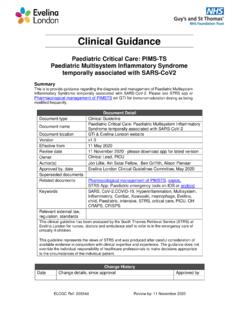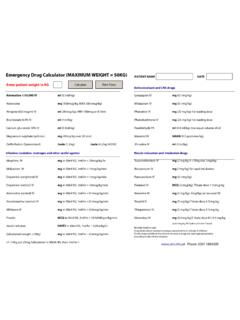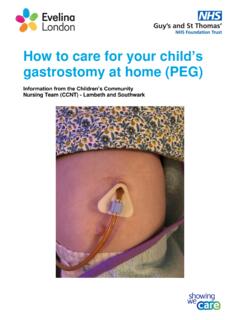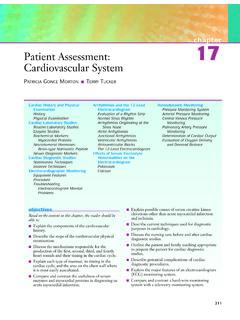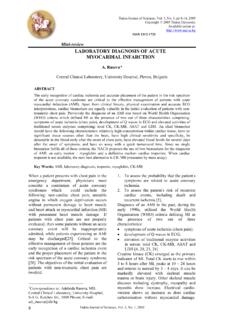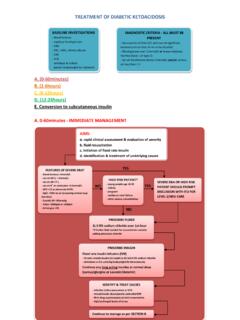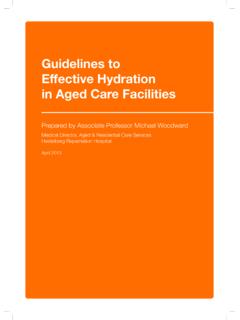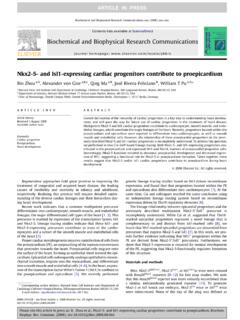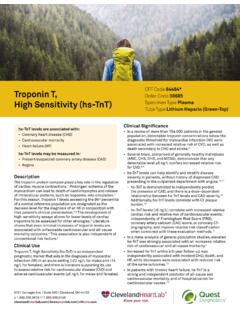Transcription of Clinical Guidance - Evelina London
1 ELCGC Ref: 21015j Review Date 13th January 2022 Clinical Guidance Paediatric Critical Care: PIMS-TS Paediatric Multisystem Inflammatory Syndrome temporally associated with SARS-CoV2 Summary This is to provide Guidance regarding the diagnosis and management of Paediatric Multisystem Inflammatory Syndrome temporally associated with SARS-CoV-2. Please see STRS app or PIMS-TS: Referral pathway and Clinical management guideline on GTi for immunomodulation dosing as being modified frequently. Document Detail Document type Clinical Guideline Document name Paediatric Critical Care: Paediatric Multisystem Inflammatory Syndrome temporally associated with SARS-CoV-2 Document location GTi & Evelina London website Version Effective from January 2021 Review date January 2022 - please download app for latest version Owner Clinical Lead, PICU Author(s) Jon Lillie, Ain Satar Fellow, Ben Griffiths, Alison Pienaar Approved by, date Evelina London Clinical Guidelines Committee, 13th January 2021 Superseded documents Related documents PIMS-TS.
2 Referral pathway and Clinical management guideline, Sepsis guideline, STRS App: Paediatric emergency tools on IOS or android, RECOVERY trial Keywords SARS, CoV-2,COVID-19, Hyperinflammation, Multisystem, Inflammatory, Cardiac, Kawasaki, Evelina , child, Paediatric, STRS, critical care, PICU, PIMS, TS, MISC, MIS-C, Relevant external law, regulation, standards This Clinical guideline has been produced by the South Thames Retrieval Service (STRS) at Evelina London for nurses, doctors and ambulance staff to refer to in the emergency care of critically ill guideline represents the views of STRS and was produced after careful consideration of available evidence in conjunction with Clinical expertise and experience.
3 The Guidance does not override the individual responsibility of healthcare professionals to make decisions appropriate to the circumstances of the individual patient. Change History Date Change details, since approval Approved by December 20 Dosing for methylpred, aspirin, IVIG all amended. Cardiac complications expanded. Emphasis on not missing sepsis and that some children do not need critical care. ELCGC ELCGC Ref: 21015j Review Date 13th January 2022 Paediatric Critical Care Paediatric Multisystem Inflammatory Syndrome temporally associated with SARS-CoV-2 PIMS-TS: Referral pathway and Clinical management guideline /STRS app has latest immunomodulation Guidance Critical care management Patient to be managed as COVID+ until 2x PCR negative Central venous access.
4 Awake femoral line preferable in self ventilating patients-most require noradrenaline if shocked Temperature control regular paracetamol, active cooling if ventilated Enteral aspirin 5mg/kg (max 75mg) with PPI Children >5 years: commence DVT prophylaxis: TED stockings, consider LMW heparin or IV UF heparin (check coagulation profile prior to starting) Monitoring: Echo and 12 lead ECG at admission. Repeat as indicated. If oxygen requirement repeat CXR Regular blood gas measure lactate Repeat core investigations 12 hourly if rising inflammatory markers discuss urgently with ID team.
5 Immunomodulation to be guided by ID and MDT. Consider entry into RECOVERY trial, will influence the following: IVIG 2g/kg (use IBW) (must save serum before giving) monitor for fluid overload during infusion. Methylprednisolone 10mg/kg (max 1 gram) daily for 3 days Additional immunomodulation may include: Tocilizumab (IL-6 receptor antibody) Repeat IVIG dose Longer duration of steroids Anakinra (IL-1 receptor antagonist) Infliximab (monoclonal antibody) Clinical features May include one or more of the following: Persistent Fever > 39 C Lethargy and Myalgia Abdominal Symptoms: Pain, Diarrhoea and Vomiting Rash/Conjunctivitis Hypotension (Wide pulse pressure), tachycardia +/- Shock Initial management Examination.
6 Exclude potential septic foci and careful cardiac assessment (liver, JVP, cardiac / thoracic ratio on CXR) Resuscitation: If signs of shock fluid resuscitation (10ml/kg aliquots) with re-evaluation after each bolus and discuss with STRS If no improvement with fluid, start inotropes: Dopamine@ 5 - 10mcg/kg/min, until central access (consider noradrenaline) Ceftriaxone and Clindamycin as sepsis impossible to exclude Anaesthetic team review and discuss with STRS Severe myocardial dysfunction common: If intubation required: cardio-stable induction (ketamine+ draw up emergency drugs) Caution on moving ventilated patients -instability observed in severe cardiac dysfunction (extremely preload dependant) Monitor for arrhythmias Cardiac Manifestations and Management Pancarditis may include.
7 Bi-ventricular impairment, mitral/ tricuspid valve regurgitation, diastolic dysfunction, arrhythmia, pericardial effusion, coronary artery dilatation / aneurysm Clinical course unpredictable with rapid deterioration observed in some 12 lead ECG arrhythmias reported Urgent echocardiogram Low threshold for milrinone infusion Severe cases consider levosimendan or argipressin based on Clinical picture: cardiac function vs vasoplegia VA ECMO for refractory shock crossmatch blood Investigations Core investigations: FBC, Full biochemical profile (Na, K, Ur, Cr, Ca, Phos, Mg, LFTs) CRP, PCT, ESR Ferritin, Triglycerides, Trop-T, D-Dimers, CK, NT-proBNP, LDH Coagulation profile (Including Fibrinogen) Blood / Urine culture Save serum & EDTA sample Chest X-ray Consider abdominal imaging to exclude abdominal pathology Additional investigations (PICU admission) Vitamin D, amylase, ASOT Group and Save (crossmatch if considering ECMO) Blood film Virology for SARS-CoV-2 PCR on Stool, NPA, BAL and blood, serology for SARS-CoV-2 DIAMOND Trial pack M C & S.
8 BAL, urine, throat swab Standard Respiratory Viral panel - NPA or throat swab Viral serology blood PCR: EBV, CMV, Adeno, Enterovirus Blood PCR: Pneumococ., Meningococ., Group A strep, Staph A The Covid-19 pandemic has been temporally associated with the emergence of a paediatric presentation of severe inflammation and shock. This syndrome has Clinical similarities to Kawasaki shock and toxic shock and it can be difficult to differentiate at presentation thus management must include antibiotics and cardiac assessment. Very few patients have had coronavirus detected by PCR on throat/nasal swabs, however serological evidence of SARS-CoV-2 infection is present in the majority.
9 The spectrum of disease is wide; children who are cardiovascularly stable can be managed locally with advice from paediatric ID team. Please refer to STRS if signs of shock, deterioration or planned for transfer. Laboratory features Hyponatraemia Raised CRP Raised Ferritin (>500) Raised Troponin and B-NP Raised Fibrinogen Lymphopenia / neutrophilia Raised D-Dimer Platelets initially low or normal Renal dysfunction Significant similarity in presentation with other paediatric conditions Septic shock - may require higher volume fluid resuscitation and source control: senior Clinical review Peritonitis -negative laparotomy reported in some cases.
10 Cautious specialist surgical review with appropriate radiology Therapy Complications Fluid overload risk with IVIG infusion consider diuretics Hypertension: methylprednisolone associated with hypertension and PRES. Treat with Ca channel blockade or if severe cardiac dysfunction use SNP. Hyperglycaemia: may require insulin infusion. Salicylate complications: AKI, Respiratory alkalosis Gastritis Step down Consider HDU step down when off Noradrenaline 6-12 h Milrinone to continue on HDU if impaired cardiac function Leave central line in situ if twice daily bloods required Aspirin: continue for 6 weeks and confirm coronaries normal Methylprednisolone, usually stop or reduce after 3 days
